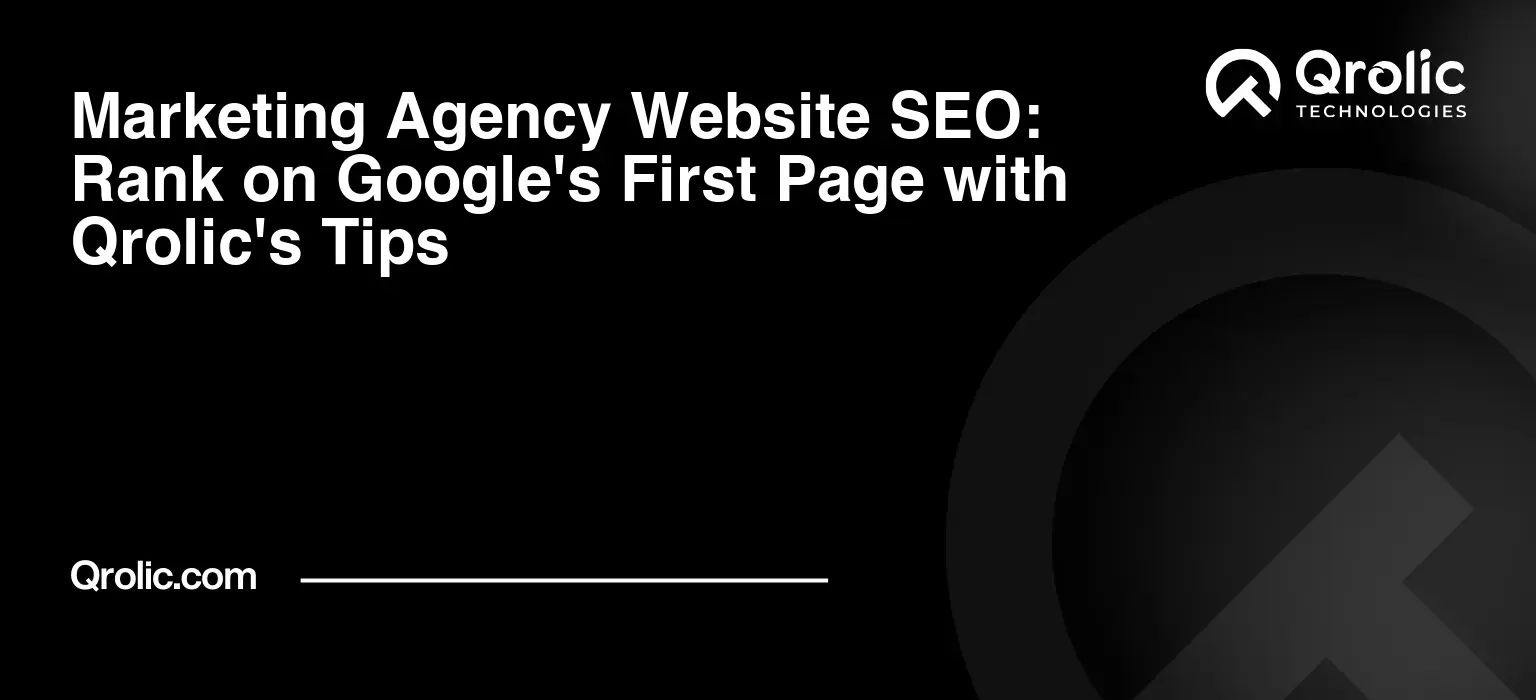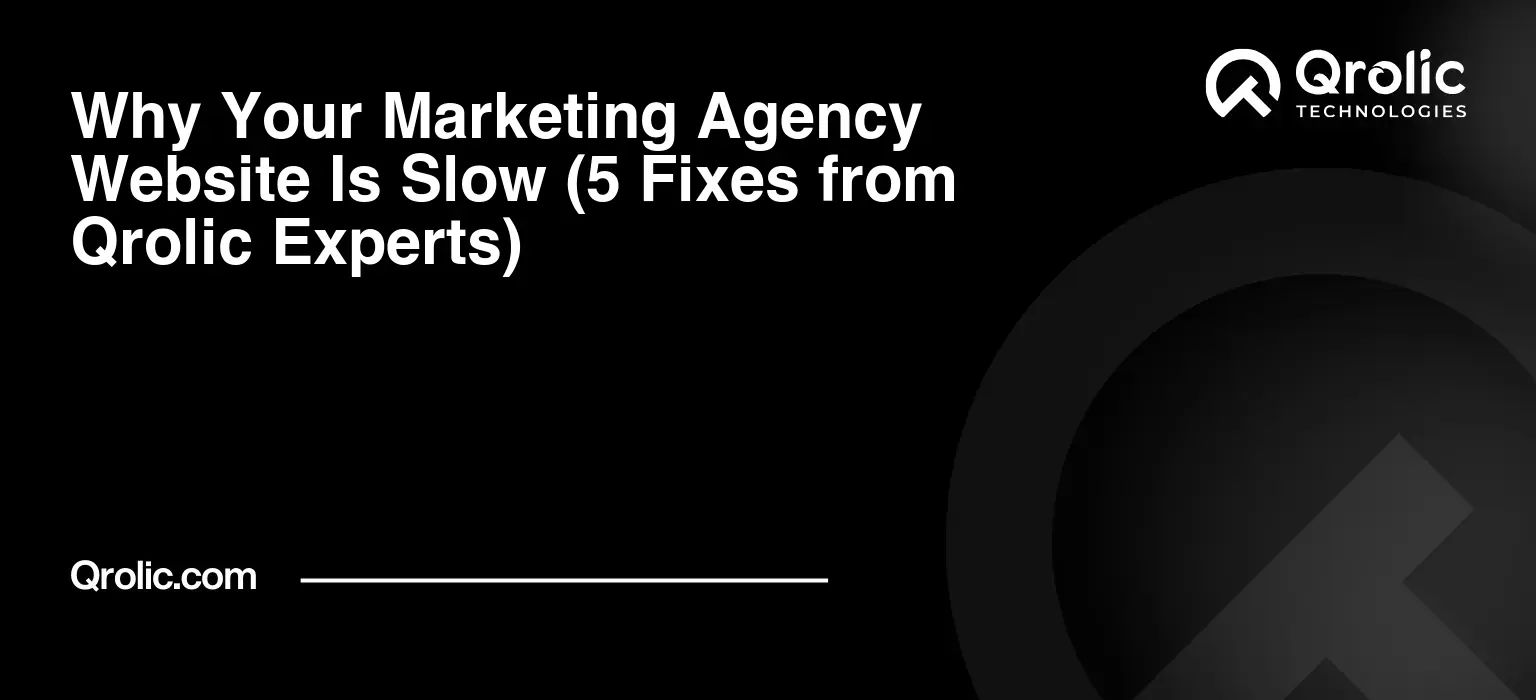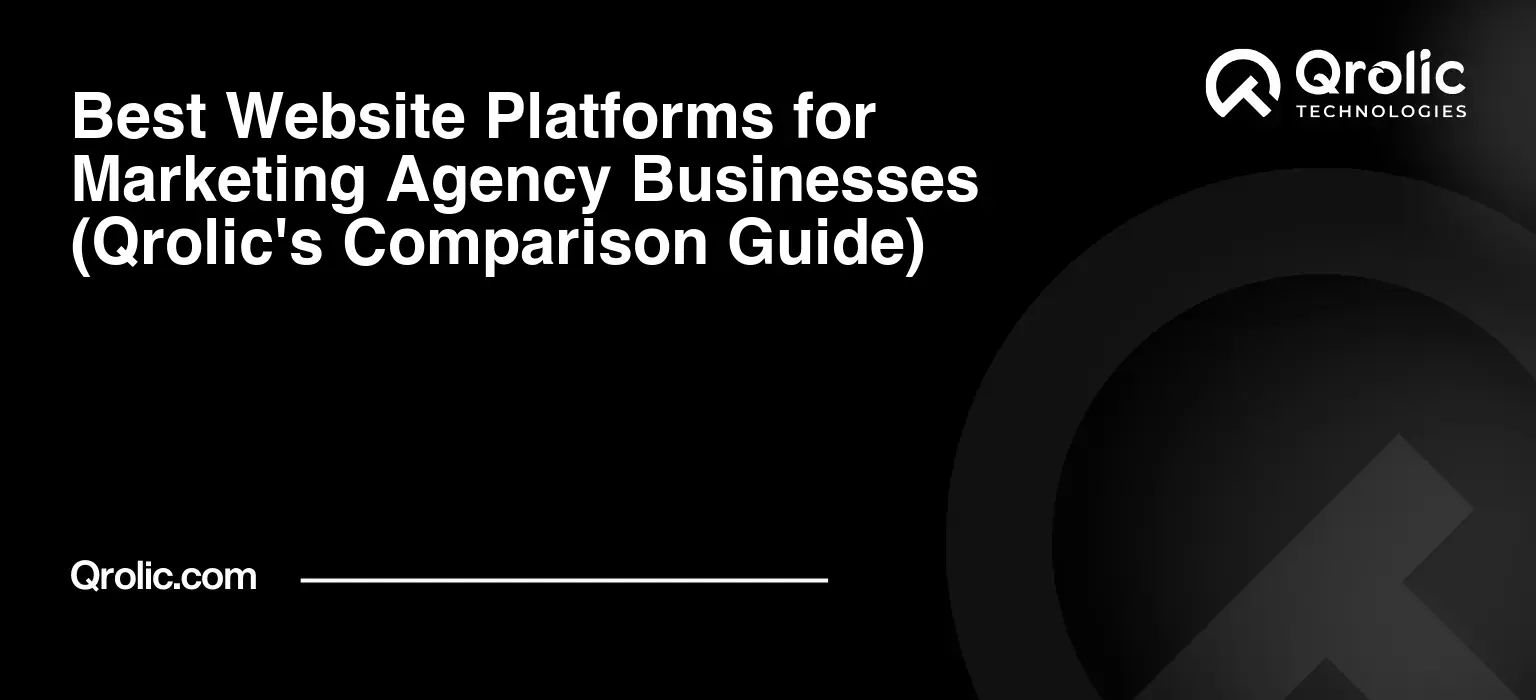Navigating the Digital Landscape: Choosing the Ideal Website Platform for Your Marketing Agency
In today’s hyper-competitive digital arena, your marketing agency’s website isn’t just a static brochure; it’s your digital storefront, your 24/7 salesperson, and often, the first tangible impression potential clients have of your expertise. Choosing the best website platform for marketing agency businesses isn’t merely a technical decision; it’s a strategic imperative that directly impacts your brand’s perception, lead generation capabilities, and operational efficiency. Imagine having a thousand years of wisdom, witnessing countless digital transformations – the fundamental truth remains: a powerful, responsive, and intelligently built website is the cornerstone of any successful marketing agency. This comprehensive guide will walk you through the labyrinth of options, ensuring you select the perfect marketing agency website tools to elevate your business.
Quick Summary:
- Your agency’s website is vital for leads and brand.
- Choose platforms based on scalability, SEO, and design needs.
- Options range from flexible WordPress to integrated HubSpot.
- Continuously optimize your site to stay competitive.
Table of Contents
- Navigating the Digital Landscape: Choosing the Ideal Website Platform for Your Marketing Agency
- Why Your Marketing Agency’s Website Platform Matters More Than Ever
- The First Impression is Everything
- Showcasing Your Expertise
- Lead Generation Powerhouse
- Operational Efficiency
- Key Considerations When Selecting a Website Platform for Your Marketing Agency
- Scalability for Growth
- Design Flexibility & Customization
- SEO Capabilities
- Integration Ecosystem
- Ease of Use & Maintenance
- Security & Reliability
- Cost-Effectiveness
- Support & Community
- Top Website Platforms for Marketing Agency Businesses: A Deep Dive
- WordPress (Self-Hosted with Elementor/Beaver Builder/Divi): The Undisputed King of Flexibility
- Webflow: The Designer’s Dream for Pixel-Perfect Websites
- HubSpot CMS Hub: The Marketing Powerhouse (Especially for Inbound Agencies)
- Wix/Squarespace: User-Friendly and Visually Appealing (For Smaller Agencies or Niche Focus)
- Custom-Built Solutions (Laravel, React, Next.js): When Uniqueness is Paramount
- Practical Strategies for Building Your Marketing Agency’s Website
- Define Your Agency’s Persona & Goals
- Content is King (and Queen)
- Optimize for Speed and Mobile-First
- Implement Robust Lead Capture Mechanisms
- Leverage SEO Best Practices
- Integrate Essential Marketing Tools
- Regular Updates and Maintenance
- The “What”: What Kind of Content Should Your Agency Website Feature?
- The “Why”: Why is Continuous Optimization Essential?
- The “How”: How to Measure Your Website’s Performance?
- Qrolic Technologies: Your Partner in Crafting Exceptional Agency Websites
- What We Do
- Why Partner with Qrolic?
- How Qrolic Can Help Your Agency
- Benefits of Choosing Qrolic
- Future-Proofing Your Marketing Agency’s Website: Trends to Watch
- AI and Personalization
- Voice Search Optimization
- Core Web Vitals & Page Experience
- Interactive Content
- No-Code/Low-Code Acceleration
- FAQs: Answering Your Burning Questions About Agency Website Platforms
- What is the most cost-effective platform for a new marketing agency?
- Which platform offers the best SEO control?
- Can I migrate my existing agency website to a new platform?
- How often should a marketing agency redesign its website?
- Do I need a custom-built website as a marketing agency?
- Conclusion: Your Digital Foundation for Marketing Agency Success
Why Your Marketing Agency’s Website Platform Matters More Than Ever
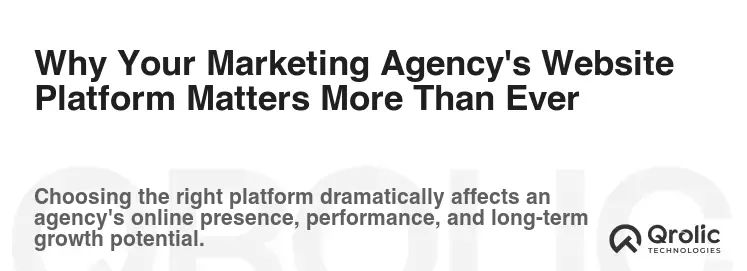
Your agency thrives on helping other businesses succeed online, yet ironically, many marketing agencies neglect their own digital foundation. The platform you build your website on is the bedrock of your online presence. It dictates everything from your site’s speed and security to its design flexibility and ability to capture leads.
The First Impression is Everything
Potential clients are savvy. Before they even consider reaching out, they’re scrutinizing your agency’s website. If it’s slow, outdated, difficult to navigate, or simply doesn’t reflect cutting-edge design, it sends a powerful, negative message. Conversely, a slick, fast, and user-friendly site immediately establishes credibility, showcasing your agency as a master of its craft. It’s a silent yet potent testament to your capabilities.
Showcasing Your Expertise
Your website is the ultimate portfolio. It’s where you display your successful case studies, highlight your diverse service offerings, and establish your thought leadership through insightful blog posts. The right digital agency web platform empowers you to present this content in an engaging, visually appealing, and easily digestible manner, making it simple for prospects to see the value you bring. Can your current platform effectively tell your success stories?
Lead Generation Powerhouse
The primary goal of most agency websites is to generate qualified leads. Your website platform needs to be more than just pretty; it must be engineered for conversion. This means robust contact forms, seamless CRM integration, compelling calls-to-action (CTAs), and the ability to implement sophisticated lead magnets. A platform that limits these functionalities is literally costing your agency potential revenue. Think of it as your best sales representative, tirelessly working around the clock.
Operational Efficiency
Beyond attracting clients, your website must be easy for your team to manage and update. Can your content creators easily publish new blog posts? Can your designers make quick tweaks without developer intervention? Can your SEO specialists implement necessary optimizations without fighting the system? The ease of use, maintainability, and scalability of your chosen marketing agency website builder directly affects your team’s productivity and your agency’s agility in responding to market changes. An inefficient platform can quickly become a time sink and a budget drain.
Key Considerations When Selecting a Website Platform for Your Marketing Agency

Before diving into specific platforms, it’s crucial to understand the non-negotiable criteria that should guide your decision. These factors will ensure your chosen CMS for marketing agencies aligns perfectly with your business goals and operational needs.
Scalability for Growth
Your agency isn’t static. It will grow, services will expand, and traffic will increase. Can your website platform scale effortlessly to accommodate this growth without requiring a complete overhaul every few years? Consider future demands: more content, more complex integrations, higher user loads, and diverse client needs. A platform that stifles growth is a dangerous liability.
Design Flexibility & Customization
Your brand is unique, and your website should reflect that. Generic templates can only take you so far. You need a platform that offers extensive design flexibility, allowing you to create a truly bespoke online experience. This includes control over layouts, typography, animations, and the ability to implement unique visual elements that differentiate your agency. Pixel-perfect design is often a hallmark of a professional agency.
SEO Capabilities
As a marketing agency, SEO is in your DNA. Your website platform must provide robust SEO for agency websites features. This includes:
- Clean Code: Search engines favor well-structured, fast-loading code.
- Customizable Meta Data: Title tags, meta descriptions, and URL structures.
- Schema Markup Support: For rich snippets and improved visibility.
- Fast Loading Speeds: Core Web Vitals are paramount for ranking.
- Mobile Responsiveness: A non-negotiable for modern SEO.
- XML Sitemaps & Robots.txt Control: Essential for crawling and indexing. If your platform actively hinders your ability to implement SEO best practices, it’s a non-starter.
Integration Ecosystem
Your agency uses a suite of tools: CRM, marketing automation, email marketing, analytics, project management, and more. A superior website platform should seamlessly integrate with these essential marketing agency website tools. Native integrations are ideal, but robust API access or a thriving plugin/app marketplace can also achieve this. The goal is a unified ecosystem that streamlines your workflows and provides a holistic view of your client interactions.
Ease of Use & Maintenance
Who will be managing the website day-to-day? If it requires a full-stack developer for every minor change, it’s not sustainable. Look for platforms that offer an intuitive user interface, easy content editing, and straightforward maintenance procedures. This empowers your entire team, from content writers to project managers, to contribute effectively without constant external support.
Security & Reliability
Your website holds sensitive client information and is a representation of your agency’s professionalism. Robust security features, regular backups, SSL certificates, and a reliable hosting environment are paramount. A hacked or frequently down website can decimate your reputation faster than you can say “data breach.”
Cost-Effectiveness
“Cost-effective” doesn’t necessarily mean “cheapest.” It means the best value for your investment, considering initial setup, ongoing hosting, premium themes/plugins, and potential development costs. A seemingly inexpensive platform might incur hidden costs in limited features or scalability issues down the line. Evaluate the total cost of ownership (TCO).
Support & Community
Even the most experienced teams encounter challenges. Access to reliable technical support, comprehensive documentation, and a vibrant user community can be invaluable. This ensures you’re never stranded when troubleshooting an issue or seeking guidance on best practices.
Top Website Platforms for Marketing Agency Businesses: A Deep Dive
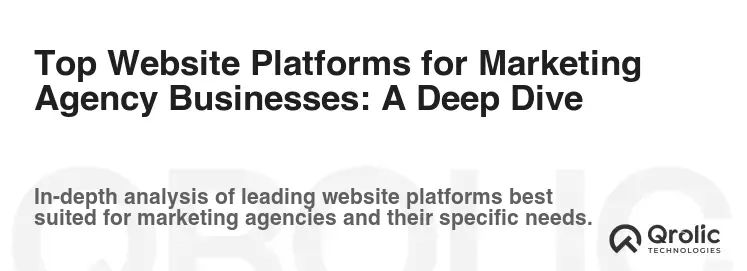
With the considerations in mind, let’s explore the leading website platforms for marketing agencies, dissecting their strengths, weaknesses, and ideal use cases. Each offers a unique blend of features and capabilities, and the “best” truly depends on your agency’s specific needs, budget, and long-term vision.
WordPress (Self-Hosted with Elementor/Beaver Builder/Divi): The Undisputed King of Flexibility
What it is: WordPress, an open-source Content Management System (CMS), powers over 40% of the internet. When combined with powerful page builders like Elementor, Beaver Builder, or Divi, it transforms into an incredibly flexible and robust website creation tool. Self-hosted WordPress gives you complete control over your site’s files, database, and hosting environment.
Why it’s great for agencies:
- Unmatched Customization: With endless themes, plugins, and custom code possibilities, WordPress offers unparalleled design freedom. You can build virtually anything, from simple portfolios to complex marketing hubs with custom functionalities.
- Vast Plugin Ecosystem: Thousands of free and premium plugins exist for virtually every need – SEO (Yoast SEO, Rank Math), forms (WPForms, Gravity Forms), security (Wordfence), caching, e-commerce (WooCommerce), and marketing automation integrations. This makes it a true “Swiss Army knife” among marketing agency website tools.
- SEO Prowess: WordPress is inherently SEO-friendly, and with the right plugins, you gain granular control over every SEO element. Clean code, customizable URLs, meta descriptions, schema markup, and fast loading speeds are all achievable.
- Cost-Effective: The core WordPress software is free. Your main costs are hosting, a premium theme/page builder (often a one-time purchase or annual subscription), and premium plugins. This can be significantly cheaper than proprietary platforms over the long term.
- Huge Community & Support: With millions of users and developers, finding support, tutorials, and expert help is incredibly easy.
How to leverage it:
- Showcase diverse portfolios: Use custom post types and advanced galleries to display client work beautifully.
- Build comprehensive resource libraries: Host whitepapers, e-books, and case studies with gated content features.
- Rapidly prototype client sites: Its flexibility makes it a great sandbox for client projects too.
- Create dynamic landing pages: Use page builders to quickly spin up conversion-focused landing pages for campaigns.
Benefits: Total ownership, limitless scalability, the ultimate SEO control, huge talent pool, and a solution for almost every marketing need. This is often the go-to CMS for marketing agencies that value flexibility and control.
Challenges:
- Maintenance & Security: As an open-source platform, you are responsible for updates, backups, and security. This requires vigilance or a reliable maintenance plan.
- Can be Complex: While page builders simplify design, maximizing WordPress’s potential sometimes requires a degree of technical understanding or hiring a skilled developer.
- Performance Optimization: Out of the box, WordPress can be slow if not optimized with caching, image compression, and a good host.
Webflow: The Designer’s Dream for Pixel-Perfect Websites
What it is: Webflow is a powerful visual development platform that blends design, CMS, and hosting into a single, cohesive service. It’s often described as a “no-code/low-code” tool that generates clean, semantic code, allowing designers to build complex, responsive websites without writing a single line of traditional code.
Why it’s great for agencies:
- Design Freedom Without Code: For agencies with strong design capabilities, Webflow offers a level of design control traditionally only possible with custom coding. You can create intricate layouts, custom animations, and unique interactions directly in the visual editor.
- Clean, Semantic Code: Unlike some drag-and-drop builders, Webflow produces incredibly clean and optimized HTML, CSS, and JavaScript. This is excellent for SEO and performance.
- Integrated CMS: Webflow includes a robust, flexible CMS that allows you to define custom content types (e.g., case studies, team members, blog posts) and manage them easily.
- Excellent Performance: Webflow’s hosting is optimized for speed and reliability, ensuring your agency website loads quickly, which is critical for user experience and Core Web Vitals.
- Client Collaboration: The editor mode allows clients or content managers to make text and image edits without breaking the design.
How to leverage it:
- Build stunning, award-winning agency portfolios: Showcase your design prowess directly through your website’s aesthetics.
- Rapidly prototype and iterate on designs: Its visual interface speeds up the design-to-development process.
- Create custom content structures: Tailor your CMS to perfectly fit your agency’s content strategy, like highly detailed case study pages.
Benefits: Pixel-perfect design, superior performance, robust CMS, excellent for design-focused website platform needs, strong SEO foundation. It’s an ideal marketing agency website tool for agencies that prioritize visual excellence and conversion-focused design.
Challenges:
- Steeper Learning Curve: While “no-code,” mastering Webflow’s design panel and logic can take time, especially if you’re unfamiliar with web design principles (like the box model).
- Pricing: Webflow’s pricing can scale as your needs grow, especially for multiple client sites or larger CMS collections.
- Less Plugin-Dependent: While it integrates with many third-party services, its plugin ecosystem isn’t as vast as WordPress, meaning some functionalities might require custom code embeds.
HubSpot CMS Hub: The Marketing Powerhouse (Especially for Inbound Agencies)
What it is: HubSpot CMS Hub is an integrated content management system built specifically for marketers and businesses focused on inbound strategies. It’s part of the broader HubSpot platform, which includes CRM, marketing, sales, and service tools.
Why it’s great for agencies:
- Native Integration with CRM & Marketing Automation: This is HubSpot’s biggest selling point. Your website is seamlessly connected to your CRM, allowing for personalized content, advanced lead nurturing, and detailed analytics on every visitor interaction. For agencies focused on inbound, this is a game-changer.
- Personalized Content (Smart Content): Deliver dynamic content to visitors based on their past interactions, lifecycle stage, or other CRM data. This enables highly relevant user experiences and boosts conversion rates.
- Robust Analytics & Reporting: Track every website interaction, lead conversion, and marketing campaign performance directly within the platform, providing comprehensive insights for your agency and your clients.
- Drag-and-Drop Editor & Themes: While not as granular as Webflow, HubSpot offers user-friendly drag-and-drop editing and a marketplace of professional themes, making it easy to create and manage content.
- SEO Tools Built-In: Provides SEO recommendations, topic cluster tools, and performance insights directly within the CMS.
How to leverage it:
- Create full inbound funnels: From blog posts to landing pages, lead forms, and automated email sequences, all within one platform.
- Host personalized client portals: Offer clients a customized experience based on their specific needs.
- Track lead attribution with precision: Understand which content and campaigns are driving the most qualified leads for your agency.
Benefits: Unparalleled CRM integrated website experience, powerful personalization, comprehensive analytics, dedicated marketing features, strong lead generation capabilities, and excellent for inbound marketing website platform strategies.
Challenges:
- Higher Price Point: HubSpot CMS Hub can be a significant investment, especially for smaller agencies. Its value really shines when you fully utilize its broader ecosystem.
- Less Design Flexibility: While customizable, it’s generally less flexible than WordPress or Webflow for highly bespoke designs, relying more on themes and modules.
- Vendor Lock-in: Moving away from HubSpot after investing heavily in its ecosystem can be challenging.
Wix/Squarespace: User-Friendly and Visually Appealing (For Smaller Agencies or Niche Focus)
What it is: Wix and Squarespace are all-in-one website builders that offer hosting, templates, and a drag-and-drop interface for creating websites quickly and easily. They are popular for individuals and small businesses due to their simplicity and attractive templates.
Why it’s great for agencies:
- Extreme Ease of Use: Their intuitive drag-and-drop interfaces mean virtually anyone can build a website without any coding knowledge. This makes them ideal for quickly launching a new agency or a niche service.
- Beautiful Templates: Both platforms offer a wide range of professionally designed, mobile-responsive templates that can get your agency looking good fast.
- Integrated Hosting & Security: Hosting, SSL, and basic security are all handled by the platform, simplifying maintenance.
- Cost-Effective Entry: Relatively low monthly subscription fees make them accessible for new or budget-conscious agencies.
How to leverage it:
- Rapidly launch a portfolio site: If your primary need is a simple, visually appealing portfolio to get started quickly.
- Test a new niche or service: Use it to create a dedicated micro-site for a specific offering without significant investment.
- Small team agencies: For agencies with limited technical resources, these platforms can be a great starting point.
Benefits: Quick setup, low learning curve, integrated solutions, good for Wix for small marketing agencies and Squarespace agency portfolio needs, visually attractive.
Challenges:
- Limited Customizability: While templates are beautiful, stepping outside their predefined structures can be difficult or impossible. This can hinder truly unique brand representation.
- Potential SEO Limitations: While they’ve improved, these platforms generally offer less granular SEO control compared to WordPress or Webflow, which can be a concern for a marketing agency.
- Vendor Lock-in: Migrating off these platforms can be challenging as you don’t own the underlying code or database in the same way you do with WordPress.
- Scalability Concerns: May not be suitable for agencies with complex requirements, high traffic, or extensive integration needs.
Custom-Built Solutions (Laravel, React, Next.js): When Uniqueness is Paramount
What it is: A custom-built website means developing a site from the ground up using modern web frameworks and programming languages like Laravel (PHP), React (JavaScript), Next.js (React framework), Vue.js, etc. This involves professional web developers building every component, database, and integration tailored specifically for your agency.
Why it’s great for agencies:
- Absolute Control & Uniqueness: If your agency requires highly specific, proprietary features, unique integrations, or a truly one-of-a-kind user experience, custom development offers limitless possibilities.
- Optimized Performance: A well-built custom site can be incredibly fast and efficient, as there’s no unnecessary code or bloat from generic platforms.
- Future-Proofing: You own the entire codebase, allowing for complete adaptability and scalability as your agency evolves. You’re not beholden to platform updates or limitations.
- Advanced Integrations: Seamlessly integrate with any existing internal tools, client systems, or specialized marketing APIs.
How to leverage it:
- Differentiate your agency with cutting-edge tech: Showcase your innovative approach by having a website that truly stands out.
- Build proprietary tools or dashboards for clients: If your agency offers unique services that require a custom client portal or reporting system.
- Establish a strong technological brand: For agencies specializing in development, SaaS marketing, or advanced data analytics, a custom site reinforces their technical prowess.
Benefits: Total ownership, ultimate flexibility, peak performance, unparalleled security (when expertly built), truly bespoke and unique features. This is the choice for agencies demanding a unique agency website or bespoke web solutions.
Challenges:
- High Cost: This is by far the most expensive option, requiring significant upfront investment in development time and expertise.
- Long Development Time: Building from scratch takes much longer than using an existing platform.
- Requires Specialized Developers: Ongoing maintenance, updates, and future enhancements will require dedicated, skilled developers, which can be costly.
- Greater Responsibility: You’re responsible for all aspects of hosting, security, and maintenance.
Practical Strategies for Building Your Marketing Agency’s Website

Regardless of the platform you choose, successful agency website development hinges on strategic planning and execution. Here’s a marketing agency website strategy to guide you:
Define Your Agency’s Persona & Goals
Before writing a single line of code or picking a template, clarify:
- Who is your ideal client? (Their pain points, industries, company size).
- What is your agency’s unique selling proposition (USP)?
- What specific actions do you want visitors to take on your site? (Fill a form, download a resource, call you, view case studies).
- What feeling or brand identity do you want to convey?
Content is King (and Queen)
Your agency’s expertise is your greatest asset. Your website must be a rich repository of valuable content:
- Services Pages: Clearly articulate your offerings with benefits-driven language.
- Portfolio/Case Studies: The most critical content for agencies. Detail client challenges, your solutions, and measurable results. Use visuals!
- About Us & Team Pages: Humanize your brand. Show your expertise and personality.
- Blog/Resources: Establish thought leadership, answer common client questions, and drive organic traffic through valuable content.
- Testimonials & Reviews: Social proof is powerful. Feature client success stories prominently.
Optimize for Speed and Mobile-First
This isn’t just a best practice; it’s a necessity. Google prioritizes fast, mobile-responsive websites.
- Image Optimization: Compress images without losing quality.
- Caching: Implement robust caching mechanisms.
- Clean Code: Ensure your chosen platform or developer produces efficient code.
- Mobile-First Design: Design and test your website primarily for mobile users.
Implement Robust Lead Capture Mechanisms
Your website is a lead generation engine.
- Clear Calls-to-Action (CTAs): Guide visitors to the next step (e.g., “Request a Free Audit,” “Download Our Guide,” “Schedule a Consultation”).
- Conversion-Optimized Forms: Simple, user-friendly forms that integrate with your CRM.
- Chatbots & Live Chat: Offer immediate assistance and capture leads proactively.
- Lead Magnets: Offer valuable content (e-books, templates, webinars) in exchange for contact information.
Leverage SEO Best Practices
As a marketing agency, your own website must rank well.
- Thorough Keyword Research: Target keywords relevant to your services and target audience.
- On-Page SEO: Optimize title tags, meta descriptions, headings, and content with keywords.
- Technical SEO: Ensure proper sitemaps, robots.txt, canonical tags, and schema markup.
- Internal Linking: Create a logical internal linking structure to boost page authority.
- Backlink Strategy: Earn high-quality backlinks to build domain authority. This is the core of optimizing agency website performance.
Integrate Essential Marketing Tools
Your website needs to be a connected hub.
- Google Analytics 4 & Google Search Console: For detailed traffic, user behavior, and SEO performance data.
- CRM (e.g., HubSpot, Salesforce): To manage leads and client relationships effectively.
- Email Marketing Platform (e.g., Mailchimp, ActiveCampaign): For nurturing leads and client communication.
- Heatmaps & Session Recordings (e.g., Hotjar): To understand user behavior on your site and identify areas for improvement.
Regular Updates and Maintenance
A website is not a “set it and forget it” asset.
- Content Freshness: Regularly publish new blog posts, update case studies, and refresh service pages.
- Software Updates: Keep your platform, themes, and plugins updated for security and performance.
- Security Audits: Conduct regular checks to prevent vulnerabilities.
- Performance Monitoring: Continuously monitor speed, uptime, and user experience.
The “What”: What Kind of Content Should Your Agency Website Feature?
Beyond the basics, think about interactive content, video testimonials, downloadable templates relevant to your niche, and detailed “how-to” guides that position your agency as an authority. Every piece of content should serve a purpose: educate, engage, convert.
The “Why”: Why is Continuous Optimization Essential?
The digital landscape is constantly evolving. Google’s algorithms change, user expectations shift, and your competitors are always innovating. Continuous optimization ensures your website remains relevant, performs optimally, and continues to drive leads and revenue, preventing stagnation and ensuring long-term success.
The “How”: How to Measure Your Website’s Performance?
Key metrics include:
- Organic Traffic: How much traffic comes from search engines.
- Conversion Rate: Percentage of visitors who complete a desired action (e.g., form submission).
- Lead Volume & Quality: Number of leads generated and their potential value.
- Bounce Rate & Time on Page: Indicators of user engagement.
- Page Load Speed: Directly impacts user experience and SEO.
- Keyword Rankings: Position of your target keywords in search results.
Qrolic Technologies: Your Partner in Crafting Exceptional Agency Websites
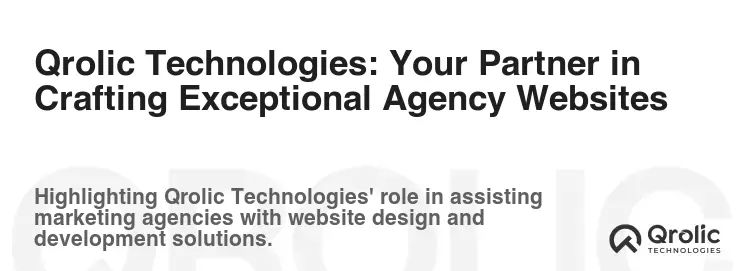
At Qrolic Technologies, we understand the unique challenges and opportunities faced by marketing agencies. We’ve witnessed firsthand how a powerful, strategically built website can transform an agency’s growth trajectory. With our deep expertise in a diverse range of marketing agency website tools and platforms, we are uniquely positioned to help your agency build an online presence that not only impresses but also converts.
What We Do
Qrolic Technologies specializes in comprehensive Web Development and digital solutions. From robust custom builds to expertly configured CMS platforms like WordPress, Webflow, and HubSpot, we craft websites that are not just visually stunning but are engineered for performance, scalability, and lead generation. We integrate the latest design trends with cutting-edge technical capabilities to deliver a truly exceptional digital experience.
Why Partner with Qrolic?
We pride ourselves on being more than just developers; we are strategic partners.
- Deep Understanding of Agency Needs: We speak your language. We know the importance of case studies, lead capture, SEO dominance, and a pristine brand image.
- Platform Agnostic Expertise: Our team possesses in-depth knowledge across various platforms, allowing us to recommend and implement the best solution for your agency, not just the one we’re most familiar with.
- Conversion-Focused Design & Development: Every pixel and line of code we write is geared towards achieving your business objectives – attracting clients, generating leads, and showcasing your expertise.
- SEO at Our Core: As a digital agency ourselves, we embed SEO best practices into every stage of development, ensuring your site is built to rank from day one.
- Client-Centric Approach: Your vision is our blueprint. We work collaboratively, providing transparent communication and iterative development to bring your ideal website to life.
How Qrolic Can Help Your Agency
- Strategic Platform Selection: We guide you through the initial decision-making process, helping you choose the ideal website platform for marketing agency businesses based on your goals, budget, and long-term vision.
- Expert Development & Design: Our team crafts custom themes, bespoke functionalities, and integrates third-party tools, ensuring your website is aesthetically pleasing, highly functional, and conversion-optimized. Whether it’s a complex WordPress setup with custom plugins or a sleek Webflow site with intricate animations, we deliver.
- SEO & Performance Optimization: We go beyond basic SEO, implementing advanced strategies to ensure your agency ranks high in search results and delivers a lightning-fast user experience across all devices. We focus on Core Web Vitals and technical SEO from the ground up.
- Ongoing Support & Maintenance: Your website needs to evolve. We offer comprehensive maintenance plans, security updates, and performance monitoring to keep your site secure, fast, and up-to-date.
- Custom Integrations: We seamlessly connect your website with your CRM, marketing automation platforms, analytics tools, and any other crucial systems to streamline your operations and maximize your data insights.
Benefits of Choosing Qrolic
Partnering with Qrolic Technologies for your agency’s website development means gaining:
- Access to seasoned experts: Leveraging years of experience in web development and digital marketing.
- Tailored solutions: A website built precisely for your unique brand and business objectives.
- Peace of mind: Knowing your digital foundation is robust, secure, and future-proof.
- Focus on ROI: A website designed to attract, engage, and convert your ideal clients, driving tangible business growth.
- A competitive edge: An online presence that truly reflects your agency’s commitment to excellence and innovation.
Visit us at https://qrolic.com/ to explore how we can elevate your agency’s digital presence and empower your growth.
Future-Proofing Your Marketing Agency’s Website: Trends to Watch
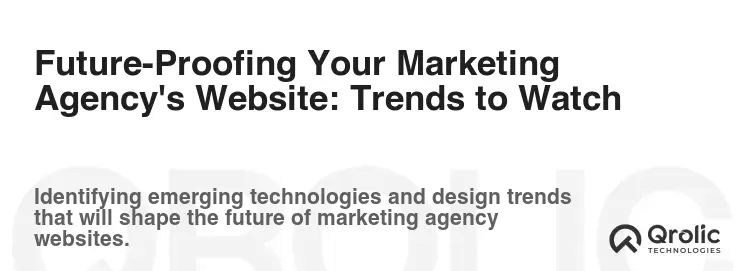
The digital world never stands still. To ensure your marketing agency’s website remains effective and relevant, it’s crucial to keep an eye on emerging trends. Incorporating these into your future of agency websites strategy will give you a significant competitive advantage.
AI and Personalization
Artificial intelligence is rapidly transforming web experiences. Expect to see more dynamic content that adapts to individual user behavior, AI-powered chatbots for instant support and lead qualification, and hyper-personalized recommendations that make every visitor feel uniquely catered to.
Voice Search Optimization
With the rise of smart speakers and voice assistants, optimizing for voice search is becoming essential. This means focusing on natural language queries, conversational keywords, and providing direct, concise answers to potential client questions.
Core Web Vitals & Page Experience
Google’s emphasis on user experience (UX) through Core Web Vitals (Largest Contentful Paint, First Input Delay, Cumulative Layout Shift) will only intensify. Agencies must prioritize Website Speed, responsiveness, and visual stability to maintain and improve search rankings.
Interactive Content
Static websites are becoming a thing of the past. Incorporate interactive elements like quizzes, calculators, polls, animated infographics, and virtual tours. This not only boosts engagement but also provides valuable data about your audience.
No-Code/Low-Code Acceleration
While we discussed Webflow earlier, the broader no-code/low-code movement will continue to empower agencies to build and iterate faster. Understanding how to leverage these tools for internal processes or client work will be a key skill.
FAQs: Answering Your Burning Questions About Agency Website Platforms
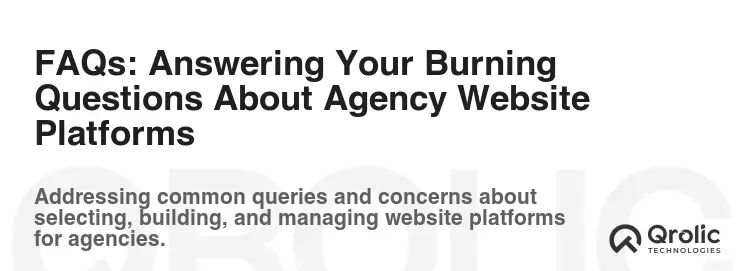
What is the most cost-effective platform for a new marketing agency?
For new agencies on a tight budget, Wix or Squarespace offer the lowest entry barrier with intuitive builders and integrated hosting. However, WordPress (self-hosted) can be very cost-effective in the long run, especially if you have some technical proficiency or hire a developer for initial setup, as core software is free and hosting is relatively cheap.
Which platform offers the best SEO control?
WordPress (with powerful SEO plugins like Yoast SEO or Rank Math) and Webflow offer the most granular and robust SEO control. Both allow for clean code, extensive meta-data customization, and are inherently optimized for performance. Custom-built solutions also offer ultimate SEO control if built correctly.
Can I migrate my existing agency website to a new platform?
Yes, website migration for agencies is a common process. It typically involves transferring content, redesigning the site on the new platform, redirecting old URLs, and meticulously preserving SEO value. The complexity varies depending on your current platform and the new one. It’s often best handled by experienced web developers.
How often should a marketing agency redesign its website?
Generally, a significant redesign is recommended every 3-5 years. However, continuous optimization, minor refreshes, and content updates should happen much more frequently. A complete redesign might be necessary if your branding changes, your services evolve significantly, or your current site is failing to meet performance or lead generation goals.
Do I need a custom-built website as a marketing agency?
Not necessarily. Most marketing agencies can thrive with platforms like WordPress, Webflow, or HubSpot CMS Hub. A custom website development for agencies is primarily beneficial if you require highly unique functionalities, proprietary tools, unparalleled scalability, or if your agency’s brand identity hinges on showcasing cutting-edge technology in its own digital presence. It’s a significant investment, best suited for specific, high-end needs.
Conclusion: Your Digital Foundation for Marketing Agency Success
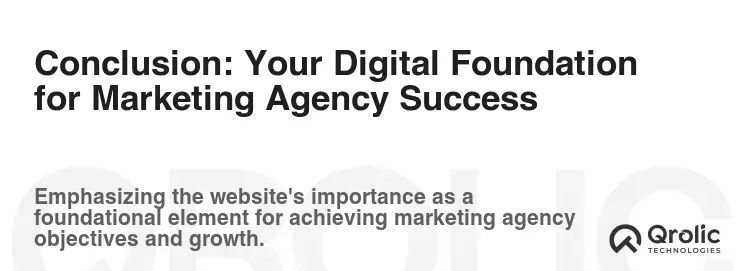
Choosing the best website platforms for marketing agency businesses is a pivotal decision that will shape your digital future. It’s about more than just aesthetics; it’s about building a powerful, scalable, and conversion-focused digital asset that works tirelessly for your agency. Whether you opt for the unparalleled flexibility of WordPress, the design freedom of Webflow, the marketing power of HubSpot, the simplicity of Wix/Squarespace, or a bespoke custom solution, remember to align your choice with your agency’s unique goals, budget, and long-term vision.
Invest wisely in your digital foundation. It’s the most powerful marketing agency website tool you possess, capable of attracting your dream clients, showcasing your expertise, and driving sustainable growth. By making an informed decision and implementing the strategies outlined in this guide, you’re not just building a website – you’re building a launchpad for your agency’s continued success. Partner with experts like Qrolic Technologies to ensure your agency’s online presence is not just good, but truly exceptional.

